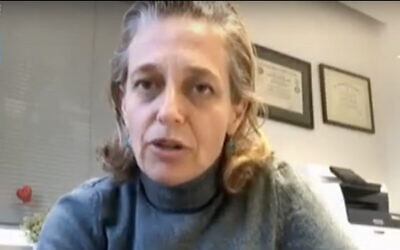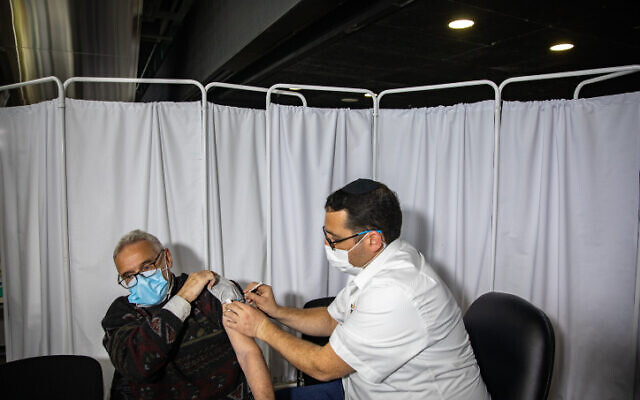For the first time, an Israeli man who previously recovered from the coronavirus was found Sunday to be reinfected with the so-called South African strain, Hebrew media reported.
The diagnosis came amid continued uncertainty on the effectiveness of the Pfizer/BioNTech vaccine that Israel is using for its mass inoculation program against the new strains of the virus.
Ziv Yaffe, 57, from the central region of the country, recently returned from Turkey. Speaking to Channel 12 news, he said that whereas during his first infection in August he had “all the symptoms,” the second time around he felt fine.
Get The Times of Israel’s Daily Edition by email and never miss our top stories
Free Sign Up
Yaffe returned to Israel on January 16. By January 23, he had a bit of a runny nose and decided to get a virus test, as he was participating in follow-up research at the Assaf Harofeh Medical Center. The test showed that he was reinfected and further testing revealed that he had caught the South African mutation.
Shai Efrati, head of research and development at the medical center, told the station that Yaffe’s case was unique because doctors had a complete medical record of his bouts with the virus.
“It is the first time that we have a full record, of infection, recovery, reinfection, and that the antibodies that he had protected him from the mutation,” Efrati said.
“What we learn is that when there are antibodies, they protect against illness,” he said.
Screen capture from video of Ziv Yaffe, left, who was reinfected with the coronavirus, and Shai Efrati of the Assaf Harofeh Medical Center. (Channel 12 news)
Efrati cautioned that it was too early to conclude that anyone who has had the disease is also protected against other mutations, saying it would require more similar cases before such conclusions could be drawn.
But, he added, Yaffe’s case is “very encouraging.”
Yaffe said that in addition to not feeling unwell, family members and others had been in close contact with him during the period of his second infection, yet none caught the virus from him.
His case is the second time the South African variant has been brought into Israel from Turkey, according to the Ynet website.
Health officials are concerned that the South African mutation, similar to the British and Californian strains which are considered more infectious, could lead to another wave of the virus among those who have recovered from previous infection and are not being vaccinated as part of the immunization drive.
All previous patients with the South African mutation, first discovered in South Africa in December, were people who came back to the country from South Africa, Ethiopia, or Dubai, according to the report.

Sharon Alroy-Preis, the acting head of the ministry’s public health division, speaks virtually to the Knesset’s Constitution, Law, and Justice Committee on January 6, 2021. (Screen capture: YouTube)
On Saturday, Dr. Sharon Alroy-Preis, the head of public health services at the Health Ministry, told the Kan public broadcaster there were preliminary indications the coronavirus vaccines may prove less effective in shielding against the South African variant.
“We don’t have evidence yet that any of the variants are completely resistant to the vaccine, but there is some preliminary evidence to say that perhaps the effectiveness of the vaccine is somewhat less against the South African variant,” Alroy-Preis said.
She said testing was still in progress to clarify the matter.
Pfizer and BioNTech, whose vaccine is being used in Israel’s world-leading vaccine drive, said Thursday that early tests suggest their immunization would be protective against the variants from South Africa and Britain.
Their study found that the antibodies were able to neutralize all the sets of mutations tested. It noted that the effect was “slightly lower” against three mutations in the variant found in South Africa, including E484K. But the firms said that it was “unlikely to lead to a significant reduction in the effectiveness of the vaccine.”
The Health Ministry last week confirmed that three more cases of the South African coronavirus variant have been found in Israel, bringing the total number of infections from the strain to 30. Three of the cases were discovered in a random sampling, raising concerns of undetected community spread.
Meanwhile, the British variant is spreading wildly in Israel, with health officials blaming the continued high coronavirus caseload after weeks of lockdown on the UK mutation. The daily infections continue to remain in the thousands, despite Israel’s strict restrictions and vaccination campaign.

A man receives a COVID-19 vaccine injection at a vaccination center in Jerusalem, on January 28, 2021. (Olivier Fitoussi/Flash90)
Over 3 million Israelis — almost one-third of its population — have received the first dose of the vaccine, and 1.7 million have received both shots. The shots are being administered according to a plan that began with medical workers, those over the age of 60 and at-risk groups, with the age limit dropping steadily as more citizens complete the two-shot vaccination cycle.
In an effort to keep the virus variants out of the country, Israel has closed its main international airport, including to its own citizens. The order is set to expire Sunday, but will likely be extended.
The government on Sunday is expected to extend the nationwide lockdown by another week to drive down infection rates.
Since the start of the virus outbreak early last year 641,373 people in Israel have been diagnosed with the virus, according to Health Ministry figures released Sunday. The death toll stood at 4,768.
Agencies contributed to this report.